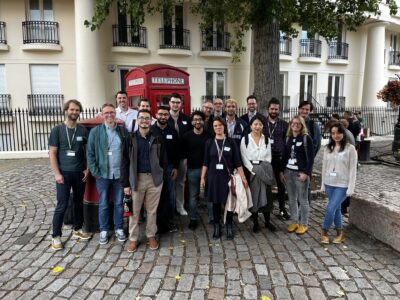The First US-UK Computational Chemistry Symposium at NU London
The US-UK Computational Chemistry Symposium, held at Northeastern University London on September 1, 2023, marked a significant milestone in computational chemistry.
Organized by Prof. Steven A. Lopez of NU Boston and Prof. Rachel Crespo-Otero of University College London, this symposium brought together leading researchers to discuss and advance cutting-edge computational chemistry.
This event highlighted the rich network of computational chemists in the United Kingdom and
served as a platform for fostering collaboration and innovation in green chemistry. The event was not only a showcase of research but also a forum for networking, collaboration, and the exchange of ideas.
Throughout the day, participants engaged in stimulating discussions on various topics, including molecular modelling, quantum chemistry, drug discovery, and materials science. One of the symposium’s central objectives was to promote collaboration among researchers from different institutions and backgrounds.
Informal breakout sessions in the spacious NU London campus further exemplified the organizers’ commitment to fostering collaborations. We expect this symposium to catalyze many new research partnerships, promising exciting breakthroughs in the coming years.
The success of the US-UK Computational Chemistry Symposium 2023 was made possible through generous funding from the National Science Foundation (NSF) in the United States and the Royal Society in the United Kingdom. Prof. Lopez and Prof.
Crespo-Otero expressed their gratitude to these organizations for their invaluable support, which enabled researchers from both countries to come together for this transformative event. In addition to covering the event expenses, the funding provided opportunities for researchers to travel and participate, breaking down geographical barriers and facilitating the exchange of knowledge between the US and the UK.
We also thank the fabulous staff at the NU London site for the fantastic communication and coordination of the event.
As the symposium came to a close, participants left with new connections, fresh insights, and a renewed sense of purpose in their pursuit of scientific excellence. With the continued support of organizations like the NSF and the Royal Society, the organizers are eager to build on the success of this event and pave the way for a brighter and more sustainable future through computational chemistry.

